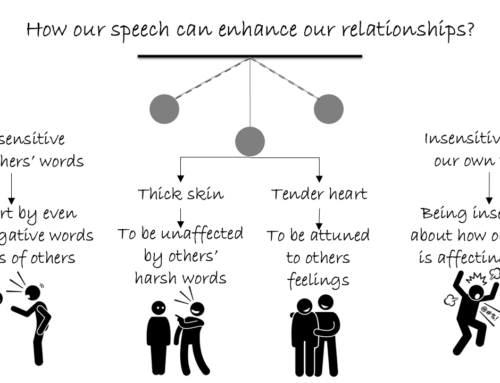How Our Words Can Make Us Strangers To Others And Even To Ourselves – If we let our yes become no and our no become yes, people will end up not knowing who we are, and even we ourselves won’t know who we really are.
The words we speak are like windows that enable others to get a glimpse of our heart. This doesn’t merely mean at a very superficial level that sweet words point to a loving heart and harsh words point to an unloving or cold heart. Such a superficial understanding may or may not be true, because people’s words may be used knowingly or sometimes reflexively as masks to hide what is in their heart.
But over time, those who consistently use soft and sweet words generally have a loving and caring heart, and those who regularly use harsh and heavy words have an unloving, uncaring heart.
Beyond how cold or warm our heart is, our words, especially in terms of our promises to do certain things or to avoid doing certain things, give others a glimpse of our character—how reliable and responsible we are. If we say yes to something and actually follow through by doing that thing, or if we promise to not do something and actually avoid doing that thing, then gradually, we gain the trust of others.
However, if we say one thing and do another, or worse still, do the exact opposite of what we said, we rapidly lose the trust of others. If our actions deviate from our words once in a while, people may overlook it, but if it happens regularly and people can no longer trust us, they may eventually start feeling that they don’t even know us. They can’t trust not just our commitments to do or not do certain actions, but even our opinions and positions.
Do we actually stand for the things we profess to stand for, or do we have hidden agendas? Such questions don’t just arise in the minds of others but start to reside there, shaping their perception of us.
If the mismatch between our words and actions leads to people not trusting us, that is bad. If it leads to people not knowing us, that is worse. But the worst outcome is when we end up not knowing ourselves. When, according to convenience, like a chameleon, we say yes to something with one group of people and no to the same thing with another group, we end up not having any positions ourselves and thereby not knowing what positions we have.
We may end up becoming worse than chameleons, because while chameleons change their color, they at least have a constant internal nature. Changing our externals repeatedly out of convenience or expedience leads to us not having any inner principles or values.
Given how disastrous fickleness in speech can be, it is no wonder that the Bhagavad Gita (17.15) declares satyam or truthfulness to be one of the key disciplines of speech. When our yeses are yeses and our nos are nos, then we know ourselves and others know us. That is the foundation for a healthy relationship with ourselves and a healthy relationship with others.
Summary:
- Our words are windows for others to peek into our heart to understand how loving or reliable we are.
- When we say yes while meaning no, and vice versa, others lose their trust in us and start treating us like strangers because they don’t know who we are.
- The mismatch between our words and actions leads to us becoming strangers to ourselves, as we don’t know our own positions or have any values that define us.
Think it over:
- How can our words act as windows for others to peek into our heart?
- How may our words estrange others from us?
- How may our words estrange us from ourselves?
***
17.15 Austerity of speech consists in speaking words that are truthful, pleasing, beneficial, and not agitating to others, and also in regularly reciting Vedic literature.




Leave A Comment